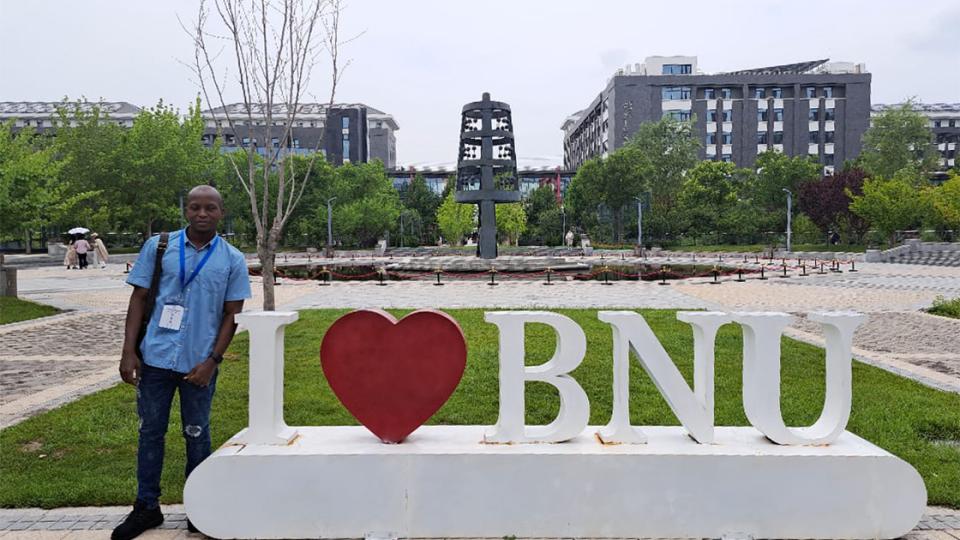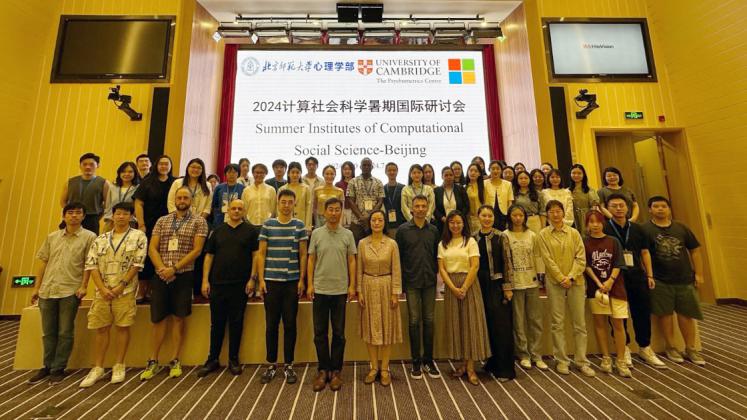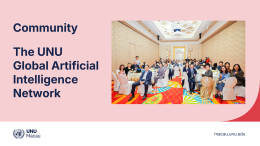From 30 June to 12 July 2024, the Summer Institute in Computational Social Science (SICSS) was hosted by Beijing Normal University in collaboration with the Psychometrics Centre at the University of Cambridge and Microsoft Research Asia. Themed “Artificial Intelligence and Social Sciences,” the summer school came at a critical time when rapid advances in AI are revolutionising social science research. I was privileged to be part of a group of graduate students, postdoctoral researchers, and early-career faculty who came together to explore the ethical and social responsibilities of AI technology.
The institute kicked off with a warm welcome from Fang Luo, the Deputy Dean and Professor at the Faculty of Psychology at Beijing Normal University. The highlight of the first day was an online keynote speech by Matthew J. Salganik from Princeton University. His talk on “Measuring the Predictability of Life Outcomes with a Scientific Mass Collaboration” highlighted the complexities of using machine learning techniques to predict life outcomes. Despite employing advanced techniques and rich datasets, the results were far from accurate, raising important questions about the reliability of predictive models especially in policymaking.

From Large language Models to Psychometrics
This summer school featured lectures with experts, small-group breakout activities for reflection and knowledge exchange, and a group project in which the participants could apply the knowledge and skills acquired during the summer school. Topics in the first week ranged from Large Language Models (LLMs) to social media and text analysis, and psychometrics. Of particular interest were the nuances of LLMs and Foundation Models, combined with the hands-on sessions where we explored Ollama, an open-source platform that simplifies the complexities of running LLMs on local machines.
In the social media and text analysis sessions, we learned about web crawling and natural language processing (NLP) techniques, essential for analysing large volumes of text data from social media platforms. The network analysis session was equally intriguing, as it provided an understanding of how different entities are interconnected, which is crucial in computational social science. The lab sessions after each lecture were the most instructive, allowing participants to get hands-on experience and reinforcing the theoretical knowledge gained earlier in the day.
What was particularly interesting for me as a participant was the chance to apply these techniques to my own dataset of App reviews and perform analyses. These weeklong sessions demystified LLMs and showcased their accessibility, versatility, and customisation potential. Psychometrics formed a significant part of our learning journey. We had sessions on Factor Analysis and Item Response Theory (IRT), focusing on developing and refining psychometric assessments. We also explored how personality traits can be integrated into LLMs, a fascinating intersection of psychology and AI.
Societal AI at Microsoft Research Asia
One of the most exciting days was our visit to Microsoft Research Asia in Haidan, Beijing. We were treated to presentations on cutting-edge research, including AI applications and the use of Co-pilot for everyday tasks. The tour of Microsoft Asia showcased various societal AI projects, such as using voices to produce audiobooks for people with disabilities. This visit underscored the real-world impact of AI and its potential to improve lives.
Reflections and Key Lessons
Attending SICSS 2024 was a transformative experience. I was particularly pleased to see such a diverse group of participants from various academic disciplines. Notwithstanding our diversity, there was a clear commitment to open and reproducible research on the ethics and social responsibility of AI. Even more pleasing was the overwhelming recognition and commitment to integrate LLMs into social science research and explore how the models can be used to better understand society. I am optimistic that with the overwhelming commitment and passion shown by the participants of the SICSS, there is hoped to pursue ethical AI research in social science.
I was impressed by the unparalleled networking opportunities among participants from various institutions and disciplines, in addition to being connected to a network of previous alumni of the summer school who are spread throughout the world. During the entire period, I had the opportunity to exchange notes with fellow participants and instructors, identifying key areas for potential collaborations.
As I left Beijing, I reflected on the key lessons I learned from participating in SICSS 2024:
- Ethical Considerations in AI Development: The importance of ethical considerations in AI development and application cannot be overstated. For research to be meaningful, we must ensure that AI does not replicate the biases inherent in society. This was a recurring theme throughout the summer school, emphasising the need for fairness and equity in AI systems.
- Limitations of AI in Social Research: While AI is revolutionising social research, it might not be the perfect solution. The discussions on the predictability of life outcomes and the reliability of predictive models in policymaking were particularly eye-opening. These conversations highlighted the complexities and limitations of using AI for social predictions, reminding us to approach AI with a critical mindset.
- Transparency, Accountability, and Responsible AI Practices: The need for transparency, accountability, and responsible AI practices was a major takeaway. Ensuring that AI systems are transparent and accountable is crucial for building trust and ensuring ethical use.
- Collaboration Across Fields: The importance of collaboration across fields to address complex societal challenges was underscored throughout the program. The interdisciplinary approach of SICSS demonstrated how combining expertise from different domains can lead to more comprehensive and effective solutions.
I was particularly pleased to see such a diverse group of participants from various academic disciplines. Notwithstanding our diversity, there was a clear commitment to open and reproducible research on the ethics and social responsibility of AI.
Conclusion
These lessons have not only broadened my understanding of AI and its implications but also inspired me to pursue ethical and responsible AI research in the future. Overall, the SICSS 2024 was a rewarding and enriching experience. It not only expanded my knowledge and skills but also inspired me to think critically about the role of AI in society and its potential to drive positive change. I look forward to applying what I have learned in my future research and professional endeavours, contributing to the ongoing dialogue on the ethical and social implications of AI technology.




